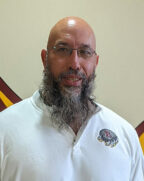BELEN—There are a lot of shining stars in Belen Consolidated Schools, and newly hired Superintendent Lawrence Sanchez wants to make them shine brighter through unification and collaboration.

Lawrence Sanchez
Belen Consolidated Schools Superintendent
“We’re not all on the same page, and that is not an easy undertaking but we know that a unit is stronger than the individual,” Sanchez said. “We need to look at the best practices throughout the district, take those best practices and share them. I’m a big believer in collaboration.”
Collaboration at all levels will make sure students are growing, and it has to include all the stakeholders, the new superintendent said.
“We need to talk to parents, we need to talk to our business members within the community, we need to talk to our students,” he said.
Sanchez was named Belen High School principal in October 2019 after serving as a principal and teacher at Belen Middle School for more than 20 years.
He began teaching at BMS in his 30s and received his administrative license in 2010, but stayed working as a teacher for several years before moving up to principal.
Now, with the 30,000-foot view of the district, Sanchez says, in a way, the district needs to work like a business in terms of focusing on its finished product.
“And I have to always put this clarifier here because I recognize we’re not a business and that our finished product is a human being,” he said. “But there are practices of business we can modify, we can apply to what we do.”
Business leaders often say their companies succeed because everyone understands what their role is in creating the finished product, and in the company’s success.
“In my mind, we need to help everybody understand, ‘What is my part and what does a Belen Consolidated Schools graduate look like? What attributes should a graduate of Belen Consolidated Schools have?’” Sanchez said. “And I say that on purpose — not Belen High School graduates, but Belen Consolidated Schools. We have two high schools and we need to make sure that’s clear.”
Getting feedback and buy in from parents, business leaders, community members, teachers and students on what that BCS graduate looks like is key, he said. That helps everyone who has influence in that student’s life understand how they help create that graduate.
“As a teacher, it’s easy for me. As a site secretary, maybe not. I want everyone to understand how they contribute to that student being successful,” Sanchez said. “They all do, but sometimes we don’t see our role.”
Sanchez jokes everything he learned about being a leader he learned from coaching, but when he talks about what the experience has brought him, it’s no laughing matter.
“No matter what sport you’re coaching, every time you play a game you’re being assessed. People watching, listening on the radio, however they do it, they’re assessing the job the staff is doing,” he said. “So you’re constantly reflecting, constantly assessing yourself if you want to be successful. You have those difficult conversations as a coach — what was working, what do we need to be a better and how we’re going to get that better the next time.”
Having developed a thick skin coaching, Sanchez said having hard conversations is a must, and everyone has to remember it isn’t personal.
“To succeed we have to be able to trust each other and understand it’s not personal,” he said. “We have to have conversations that lead to success.”
Sanchez begins his tenure as the state Legislature goes back into session in January. Public school districts receive the majority of their operational funding from the state, so Sanchez is keeping a close eye on any budget cuts that might come.
“From what I’m hearing, the budget might not be as bad as they thought, so that’s good news,” he said. “The big thing we need is for the Legislature to hold us harmless and not use our numbers for this year against us.”
Operational and transportation funding for public schools are based on enrollment and ridership numbers from the previous school year. Across the state, about 12,000 students are unaccounted for, and BCS is experiencing a chronic absenteeism rate of about 16 percent.
“If they hold us to this year’s numbers and next year we’re back to normal, I have no idea how we’re going to do that,” Sanchez said.
The district is struggling to engage some families, Sanchez told the board of education at its Dec. 8 meeting.
“We are doing everything we can — home visits, reaching out, calling. Worst case scenarios, we’ve had to talk to CYFD,” he said. “We want to ensure students are safe. Our attendance team is making these home visits, making sure families have everything they need. Whatever the issue, the coaches are trying to support families so they can engage.”
The district recently received a $198,520 federal GEERF Grant — the Governor’s Emergency Education Relief Fund — which will help families with students get connected to an internet service provider.
“This is another way to help us close that equity gap,” Sanchez said. “Right now, we’re limited to hot spots because that’s going to be easiest for us to reach areas like out on the mesa and in the southern part of the district.”
When hot spots are lent to families, the district is trying to match the service provider with one that already works in their area, he said.
“We’ve been collecting data on what cell service people are using. So if you’re on Verizon, we’ll look at getting a Verizon hot spot because we know it works well for you,” he said. “We know that not all services hit everywhere.”
Looking forward, Sanchez said he sees his position as helping students build success by removing roadblocks.
“What can I do to help?” he asks.
Julia M. Dendinger began working at the VCNB in 2006. She covers Valencia County government, Belen Consolidated Schools and the village of Bosque Farms. She is a member of the Society of Professional Journalists Rio Grande chapter’s board of directors.

















